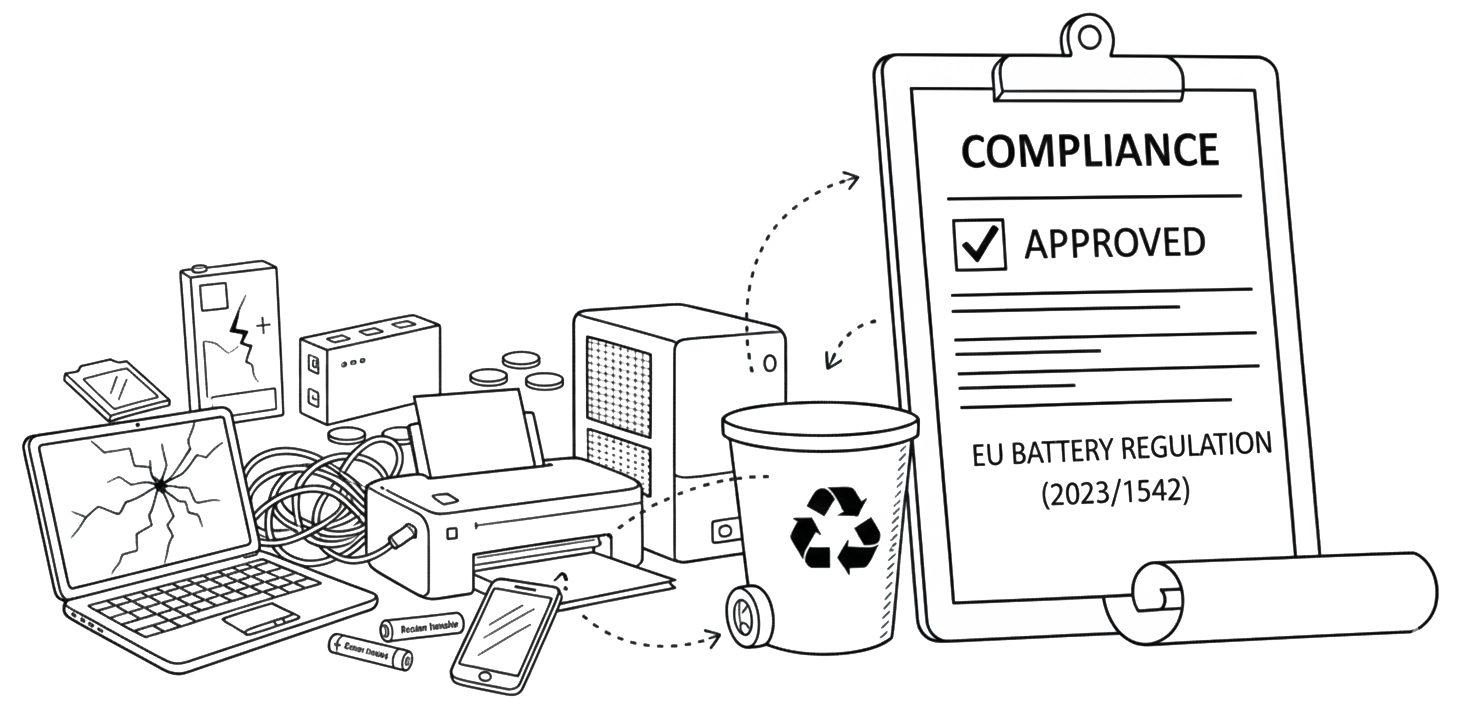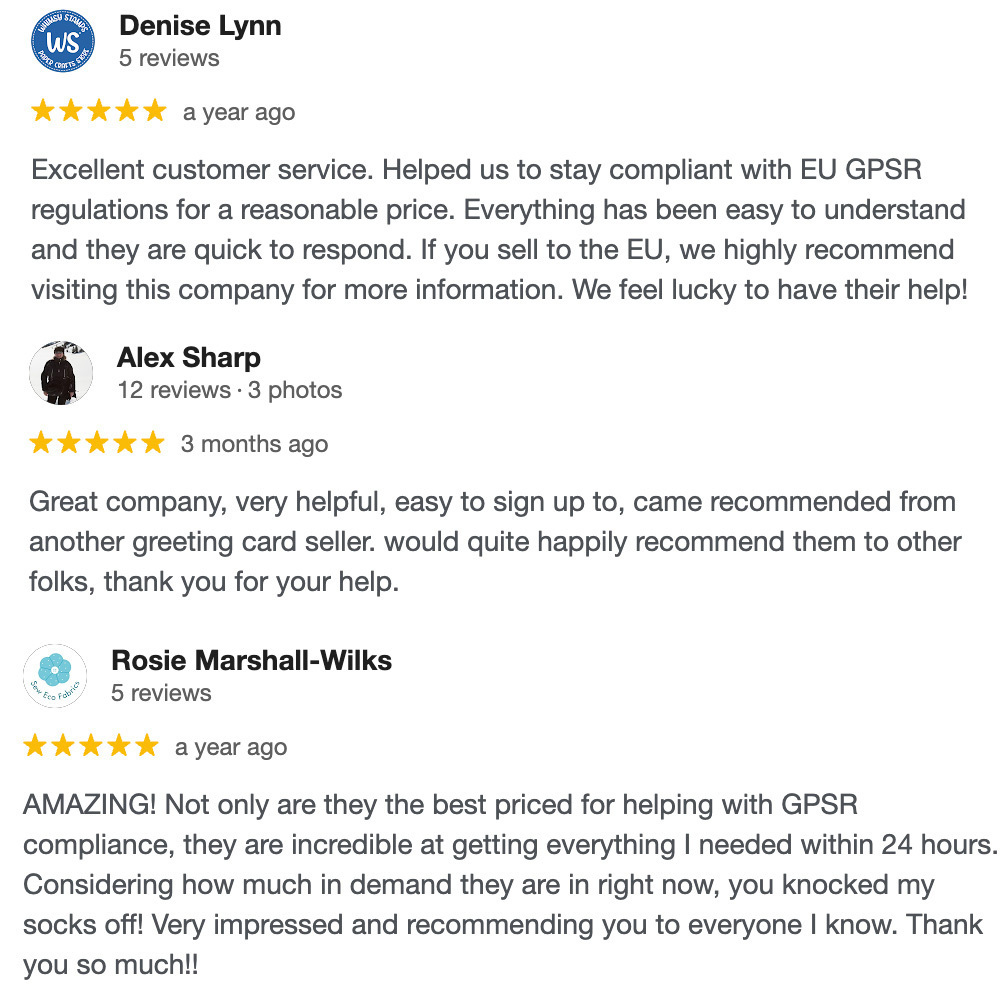Ensure Compliance with the EU Battery Regulation
The EU Battery Regulation (BattG Law) impacts retailers by imposing legal and environmental responsibilities related to the sale, collection, and recycling of batteries.

WANT TO SELL BATTERY POWERED PRODUCTS IN THE EU?
Battery regulations ensure that batteries placed on the EU market are safely collected, properly recycled, and kept out of the environment.
Producers must register under the Batteries Act (BattG), report the quantities of batteries placed on the market, and ensure compliant collection, take-back, and recycling through approved schemes — whether batteries are sold on their own or integrated into products.

RECEIVE YOUR QUOTE
DO YOU WANT TO SELL PRODUCTS CONTAINING BATTERIES?
The Battery Act (BattG) is a German law that regulates the management and disposal of batteries to minimize environmental impact and ensure proper recycling.
Amazon and other marketplaces like eBay will not allow you to sell your products if you do not have a BattG number for battery products.

ENTRY RATE
$289 first year, $239 subsequent years*
including 30€ recycling fees
You will receive...
-
Register with the "Stiftung Elektro-Altgeräte Register" (EAR)
-
BattG registration Number
-
Labelling: Correct labelling like the crossed-out wheelie bin symbol or Specific chemical symbols
-
Market Access: Legal permission to sell batteries in the EU.
HOW THE PROCESS WORKS




We determine which registration category is relevant for your products.
You tell us which countries are relevant.
Hire us - we register your brands with authorities.
WHY OUR APPROACH MAKES MORE SENSE?
OUR APPROACH
Before you pay: We will guide you on the correct path - no strings attached.
-
Recieve our compliance roadmap tailored to your products, before you commit to our service.
-
Talk to compliance experts with ecommerce expertise.
-
Keep it simple - only pay for what is minimally needed.
-
Marko our compliance manager is already working on your case, just submit your inquiry now.
OTHERS
No clear path upfront - headaches and long waiting time.
-
Talk to sales not to compliance.
-
Pay upfront, be told later you can not sell your product in this market.
-
No peace of mind.
-
Your case number is #328219 ;) Our sales department will route your request and get back to you in several business days.
ALL YOUR QUESTIONS ANSWERED BEFORE YOU COMMIT
✔️ Can I sell my products the way they are?
✔️ How much will it cost?
✔️ What documentation will I need?
✔️ Do I need to change my product labels?
✔️ Are my Products problematic in the EU/UK?
THE NEW WAY OF COMPLIANCE

| EU Compliance Partner | Big Law & Traditional Firms |
|---|---|
| ✔️ We understand the unique problems of ecommerce sellers. The law and the practical real world ways of doing business are 2 completely different things. | ❌ We are lawyers and have no real world ecommerce understanding. |
| ✔️ We pick up the phone | ❌ 7–10 days to hear back (if at all). You’re just another case number |
| ✔️ Built for speed & ecommerce reality - Fast decisions, fast execution | ❌ Built for paperwork, not sellers - Slow processes, internal approvals |
| ✔️ Personalized service for every client | ❌ Indirect, standardized handling |
| ✔️ We understand Amazon Seller Central, Shopify & other marketplaces and will guide you with practical experience | ❌ No real marketplace experience |
WHAT IS BATTG COMPLIANCE?
⚠️IF YOUR BUSINESS IS BASED OUTSIDE THE EU OR THE UK, YOU ARE LEGALLY REQUIRED TO REGISTER FOR BATTERY COMPLIANCE BEFORE SELLING PRODUCTS CONTAINING BATTERIES IN THE EU OR UK.
Battery compliance ensures that batteries are properly registered, reported, collected, and recycled in accordance with EU and UK environmental laws — whether batteries are sold on their own or integrated into products.
WE AS YOUR WEEE COMPLIANCE PARTNER BECOME:
-
Your official battery authorized representative
-
The registered contact with national battery authorities and compliance schemes
-
The party managing battery registration numbers and renewals
-
Coordinator for collection, take-back, and recycling obligations
-
Support contact in case of authority audits or enforcement actions

WHAT PRODUCTS NEED BATTG REGISTRATION?
From loose batteries and power banks to electronics with built-in batteries, toys, tools, and wearables — any product placed on the EU or UK market that contains or includes batteries requires battery registration under BattG to ensure proper collection, recycling, and environmental compliance.
| Category | Product Examples | BattG Registration Required? |
|---|---|---|
| Loose batteries | AA, AAA, button cells, coin cells | Yes |
| Rechargeable batteries | Li-ion, NiMH, power banks | Yes |
| Electronics with built-in batteries | Phones, tablets, laptops | Yes |
| Electronics with removable batteries | Remotes, toys, controllers | Yes |
| Smart & wearable devices | Smartwatches, fitness trackers | Yes |
| Battery-powered tools | Cordless drills, garden tools | Yes |
| Lighting products | Flashlights, bike lights, LED lamps | Yes |
| Medical & health devices | Thermometers, blood pressure monitors | Yes |
| Automotive batteries | Starter batteries, EV batteries | Yes |
| Industrial batteries | UPS systems, backup batteries | Yes |
| Products without batteries | Mains-powered only products | No |
WHAT OUR CUSTOMERS SAY:


READY TO START SELLING?
Fill out the Form, we get started right away, review your reuqest and get back within 48 hours.
FAQ
What is the "EU Batteries Regulation"?
The EU Battery Directive (2006/66/EC) is a regulation that applies across all EU countries, governing the placing on the market, collection, and recycling of batteries and accumulators. Each EU member state implements this directive through national legislation, such as Germany's Battery Act (Batteriegesetz, BattG). The directive's primary aim is to minimize the environmental impact of batteries by ensuring they are properly collected, treated, and recycled, thereby reducing harmful waste and promoting sustainable use of resources across the entire EU.
Do I need to register under the EU Battery Directive to sell on Amazon?
What are the consequences of non-compliance with the EU Battery Directive on Amazon?
Non-compliance can result in penalties, including fines, removal of your product listings, and suspension of your seller account. Amazon may also require you to provide proof of compliance, such as registration and labeling documentation, to continue selling battery products on the platform.
How can we help you with implementing the EU Battery Directive?
EU Compliance Partner can assist you by handling the registration process with national authorities, ensuring your products are correctly labeled, and managing your take-back and reporting obligations. We provide expert guidance to help you navigate the complexities of the EU Battery Directive, ensuring your Amazon business remains compliant and avoiding potential penalties.
Are all types of batteries covered by the Battery Act?
Yes, the Battery Act covers all types of batteries and accumulators, including:
- Portable batteries (e.g., AA, AAA, button cells).
- Automotive batteries (e.g., car batteries).
- Industrial batteries (e.g., for machinery or backup power). However, some batteries, such as those embedded in products or devices, may have different take-back and disposal requirements.
What does the "crossed-out wheeled bin" symbol mean?
The crossed-out wheeled bin symbol indicates that the battery or product should not be disposed of in regular household waste. Instead, it must be recycled or disposed of at a designated collection point. This symbol is required on all batteries in compliance with the Battery Act to inform consumers about their responsibility to dispose of used batteries properly.
What types of batteries are considered "hazardous" under the Battery Act?
Under the Battery Act, batteries are classified as hazardous if they contain certain substances above specified thresholds, such as:
- Mercury
- Cadmium
- Lead
These substances are toxic and can cause harm to human health and the environment if not properly recycled. Batteries containing more than 0.0005% mercury, 0.002% cadmium, or 0.004% lead by weight are considered hazardous and must be marked accordingly.
Do I need to label my products if they contain batteries?
Yes, under the Battery Act, all products containing batteries must be clearly labeled with the crossed-out wheeled bin symbol. Additionally, any batteries that contain hazardous substances (e.g., mercury, cadmium, lead) must be marked with the appropriate chemical symbol (e.g., Hg for mercury, Cd for cadmium) to indicate the presence of these substances. This labeling is required to inform consumers about how to properly dispose of these products and their batteries.
Is the Battery Act only for batteries sold in Germany, or does it apply to other EU countries?
The Battery Act specifically applies to the German market. However, businesses operating in the European Union must comply with similar regulations across EU member states, such as the EU Battery Directive, which has been harmonized across the EU. While national regulations like the Battery Act may differ in detail, they all aim to achieve the same goal of reducing environmental impact and promoting responsible battery disposal and recycling.
What is the difference between the Battery Act and the WEEE Directive?
The Battery Act (BattG) focuses specifically on the collection, recycling, and disposal of batteries and accumulators, while the WEEE Directive (Waste Electrical and Electronic Equipment) deals with the recycling and disposal of electronic waste. Although the two regulations cover different types of waste, they both share a common goal of reducing environmental harm and encouraging recycling. The Battery Act applies to both standalone batteries and those embedded in products, while the WEEE Directive applies to electronic devices that may contain batteries.
Experts in leading Marketplaces






